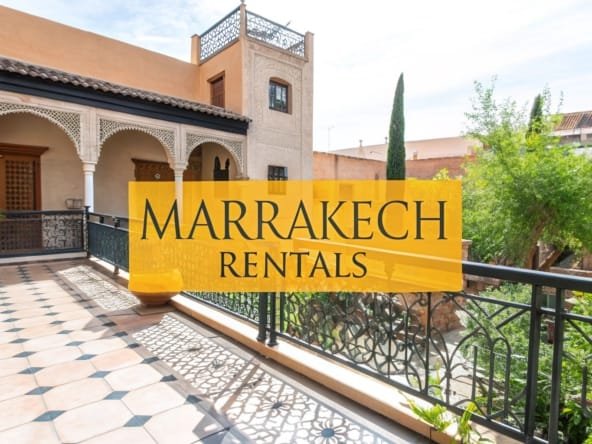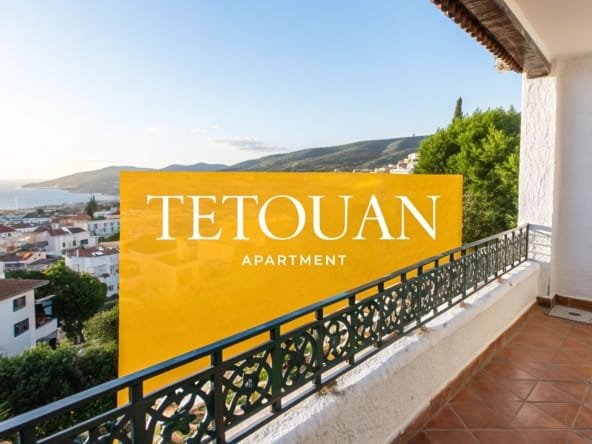When you're renting a property in Morocco, the single most important document you'll handle is the contrat de bail. This is your official rental agreement, a legally binding contract that lays out the ground rules for the tenancy. It’s designed to protect everyone involved—both the landlord and the tenant—by clearly defining each person's rights and responsibilities from the outset.
Getting to Grips With Your Moroccan Rental Agreement
Don't think of the contrat de bail as just another piece of paperwork. It’s the foundational rulebook for your entire rental journey in Morocco. Whether you’re an expat setting up in Marrakech, a student in Rabat, or a landlord renting out your flat, this document formalises your agreement. It takes you from a simple handshake to a legally recognised partnership.
This contract is your best protection against misunderstandings down the line. Its main job is to spell out every detail of the tenancy, leaving no grey areas. A properly drafted and registered agreement is the key to a smooth, conflict-free rental experience, especially in Morocco's bustling property market. With the residential lease sector projected to hit USD 10.01 billion in revenue by 2025, having a solid contract is more important than ever. You can learn more about these market trends to see just how much the landscape is evolving.
Core Components of a Moroccan Rental Agreement
A Moroccan rental agreement isn’t just a random assortment of clauses; certain elements are absolutely essential for it to be legally valid. Think of them as the pillars holding up your entire tenancy agreement. Leaving one out could weaken the contract or even make it void.
Here’s a quick rundown of what every contrat de bail in Morocco must include.
| Component | Why It Is Important |
|---|---|
| Detailed Property Description | Includes the full address and specifics of the property to avoid any confusion about what's included in the rental. |
| Parties' Identification | Requires the full legal names and ID details of both the landlord (bailleur) and the tenant (locataire) to make the contract enforceable. |
| Lease Duration | Clearly states the start and end dates, defining the exact term of the tenancy. |
| Rent Amount and Terms | Details the monthly rent (loyer), the payment due date, and how it should be paid (e.g., bank transfer, cash). |
| Security Deposit (Caution) | Specifies the amount of the deposit and the conditions for its return at the end of the lease. |
| Intended Use of Property | Clarifies if the property is for residential use only (usage d'habitation) or for professional purposes. |
Having these core components in place provides a strong, clear foundation that protects both sides.
A huge mistake many people make is glossing over the
état des lieux(property condition report). This document, signed by both you and the landlord, meticulously records the property's state when you move in. It's your best evidence when it comes to getting your security deposit back fairly.
Why You Absolutely Need a Written Contract
Verbal agreements might seem faster and less formal, but in the eyes of the law, they offer virtually no protection. Moroccan law—specifically Law 67-12—insists on a written contrat de bail for a very good reason. It establishes a legal framework to sort out any potential disputes, whether they're about late rent, property damage, or eviction processes.
Without a written contract, a tenant can't prove their right to live in the property, and a landlord will have a much tougher time enforcing the rules or reclaiming their home if something goes wrong. Ultimately, a formal agreement turns a casual arrangement into a professional one governed by clear legal standards, giving everyone involved true peace of mind.
Essential Clauses Every Tenant and Landlord Should Know
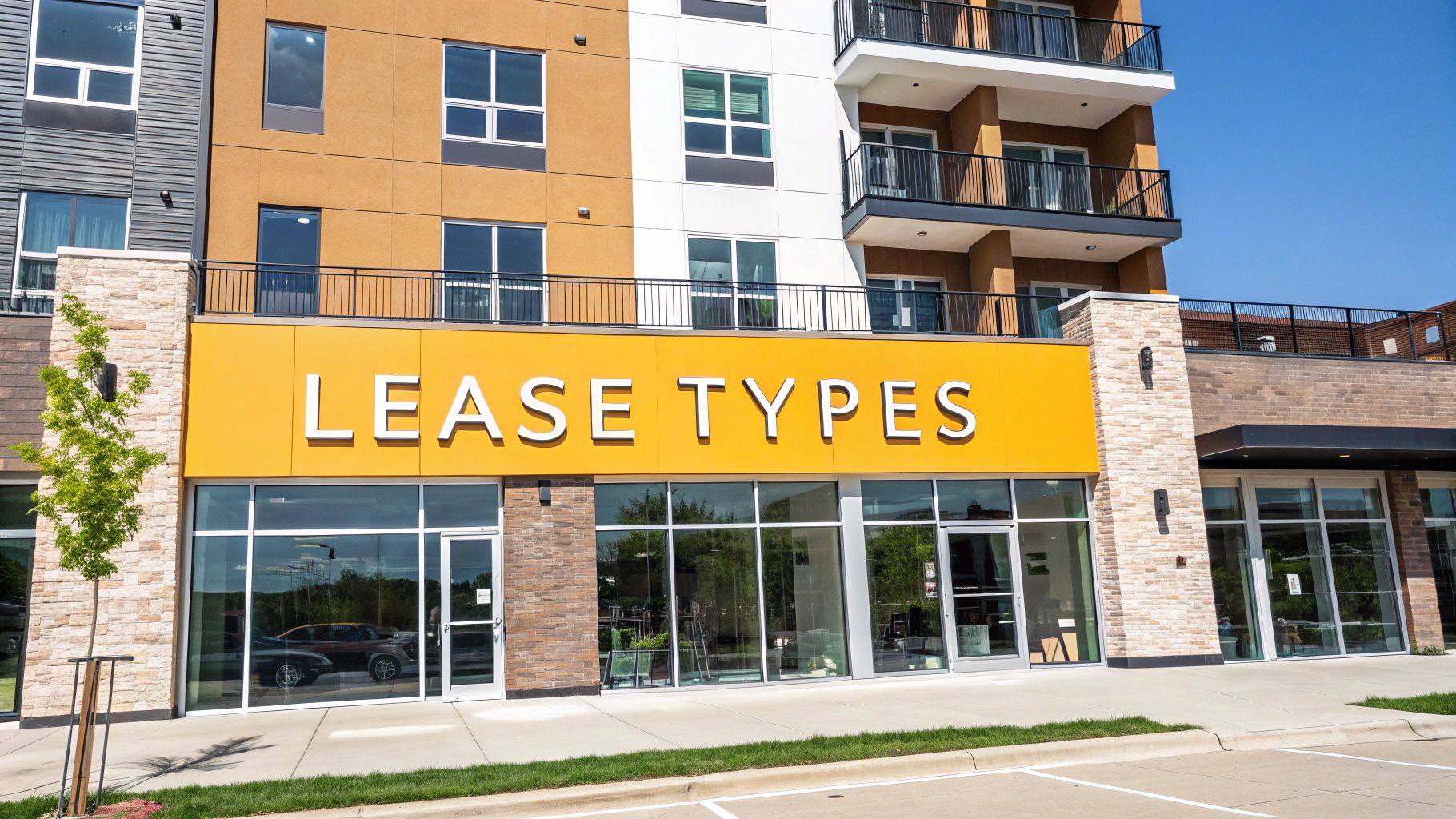
A contrat de bail maroc is far more than a simple formality; it's the detailed script that directs your entire tenancy. While the complete document might look a bit intimidating, a handful of key clauses truly form its heart. Getting a solid grasp of these specific articles is non-negotiable for protecting your interests, whether you're the one handing over the keys or the one receiving them.
Think of these clauses as the load-bearing walls of your rental agreement. If they’re weak, ambiguous, or missing altogether, the whole structure becomes unstable. Let’s break down the most critical ones you'll encounter, moving past the legal jargon to show you what they actually mean in the real world.
The Duration Clause (Clause de Durée)
This is the clause that sets the lifespan of your tenancy. In Morocco, residential leases are typically drawn up for a minimum of one year, which offers stability for the tenant and a predictable occupancy period for the landlord. But it’s more than just a start and end date; it sets the entire rhythm of the agreement.
The clause de durée is crucial because it’s directly tied to your rights for renewal and termination. Moroccan law generally leans towards lease continuity. If neither party provides formal notice to end the agreement—usually three months before the expiry date—the lease will often renew automatically under the same terms for another year. This is a practical measure that prevents abrupt moves and keeps the tenancy running smoothly.
The Rent and Charges Clause (Clause de Loyer et Charges)
Naturally, this is one of the most closely examined parts of any contrat de bail maroc. It specifies the exact rent amount (loyer) and, just as importantly, the payment schedule. It needs to clearly state the due date each month and the preferred method of payment.
But don't just stop at the base rent. This clause also outlines any extra costs, known as charges locatives. These can cover things like building maintenance fees, the concierge’s salary, or communal utilities. It is absolutely vital that the contract specifies precisely what these charges cover to prevent any nasty surprises down the line.
A well-written contract will explicitly state the conditions under which rent can be revised. Moroccan law provides a framework for rent increases, but having it clearly articulated in your lease is your best defence against unilateral or unfair hikes by the landlord.
The Security Deposit (Dépôt de Garantie)
The security deposit, known as the dépôt de garantie or caution, is a cornerstone of Moroccan rental agreements. Its job is to cover any potential damage to the property that goes beyond normal wear and tear, or to settle any unpaid rent after you've moved out.
By law, this deposit is typically capped at two months' rent. The contract must state this exact amount and—this is crucial—the conditions for its full or partial return. This is where the état des lieux (property condition report) becomes your most important tool. Without a detailed report signed at the very start, proving the property's initial condition is nearly impossible, which can seriously complicate getting your deposit back. For a deeper dive into these practicalities, check out our guide on what to expect when renting in Morocco, which covers valuable insights you won’t find elsewhere.
Key Rules for Property Use and Maintenance
Every lease will include clauses that dictate how the property can be used and who is responsible for keeping it in good shape. These rules are there to protect the property's value and ensure a peaceful living environment for everyone involved.
-
Usage des Lieux (Use of Premises): This clause defines the property's purpose. If it's rented for residential use (
usage d'habitation), you cannot legally run a commercial business from it without your landlord's explicit, written permission. -
Charges et Réparations (Charges and Repairs): This section draws the line between your responsibilities and the landlord's. As the tenant, you handle minor, day-to-day upkeep like changing light bulbs or clearing small drain clogs. The landlord, on the other hand, is responsible for major structural repairs, such as issues with the roof, faulty wiring, or significant plumbing problems.
-
Sous-location (Subletting): Subletting your apartment is almost always forbidden unless the
contrat de bail marocspecifically allows it. To stay on the right side of your contract, always assume it's not permitted without clear, written consent from the landlord.
Understanding Your Legal Rights and Obligations
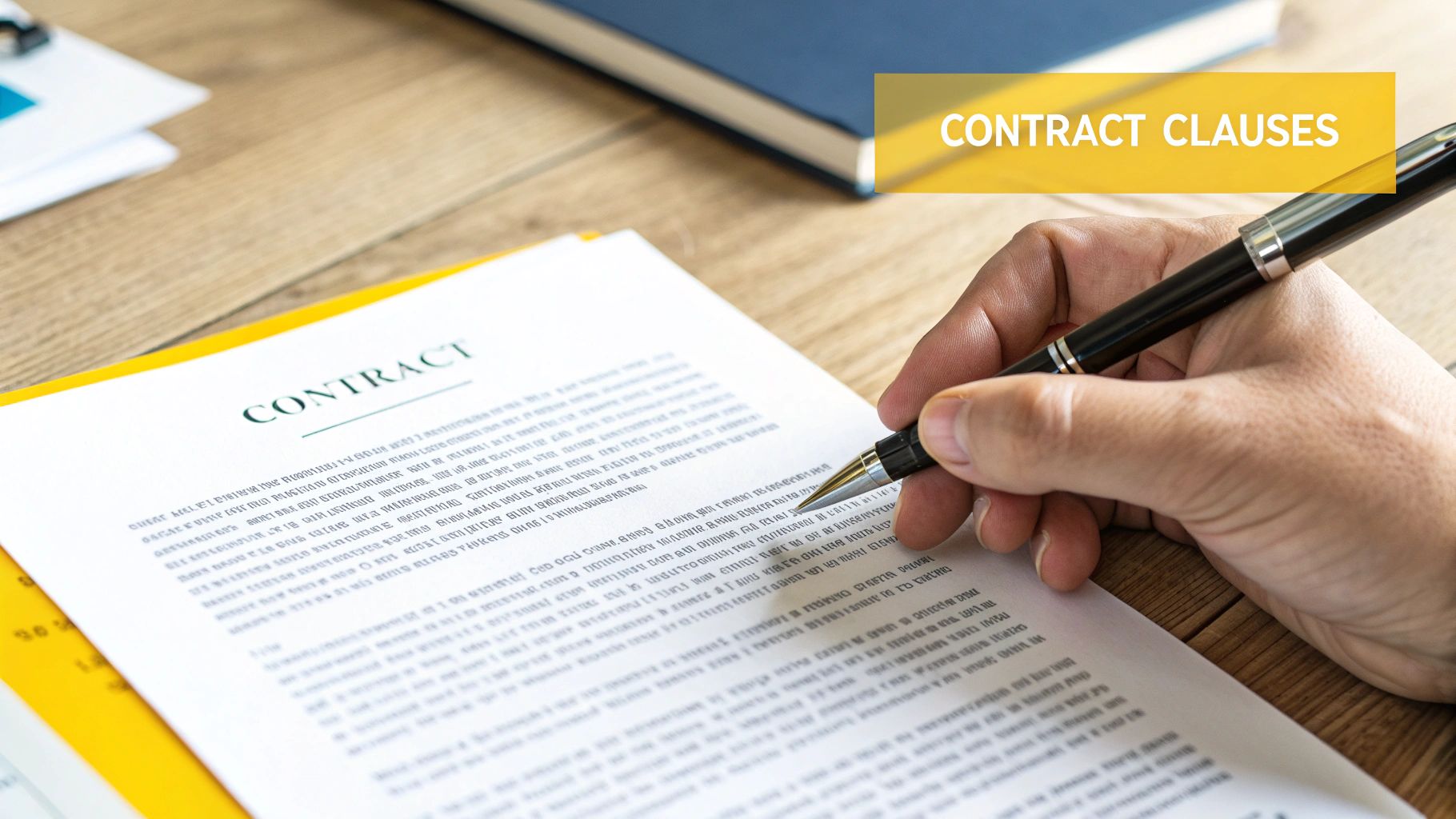
Think of a Moroccan rental agreement, or a contrat de bail, as more than just a piece of paper—it's the blueprint for a professional relationship. Both you and the other party come to the table with certain expectations. Thankfully, Moroccan law, particularly Law No. 67-12, steps in to replace assumptions with a clear set of rights and responsibilities.
Getting this balance right from the start is the secret to a smooth, conflict-free tenancy. The law isn't designed to favour one side. Instead, it creates a stable framework where everyone knows exactly what's expected of them. For a tenant, it guarantees a secure, liveable home. For a landlord, it’s about protecting an investment and ensuring a reliable income.
Let’s unpack the core duties that define this legal partnership. Understanding what the law demands from both tenants and landlords is what elevates a simple rental into a successful one.
The Tenant’s Core Rights and Duties
As a tenant, your most important right is what the law calls quiet enjoyment (jouissance paisible). In simple terms, this means the landlord can't just show up whenever they like or interfere with your life. They need your permission to enter the property, except in a true emergency. It's your home.
You also have a fundamental right to a safe and habitable space. The property must be handed over in good condition, without any serious issues that might affect your health or safety. Think working plumbing, safe wiring, and a solid structure—these are non-negotiable.
Of course, this comes with responsibilities. If something major breaks, like a water heater or a significant leak, it's up to you to let the landlord know right away. While you’re expected to handle the small stuff, the landlord is legally on the hook for the big repairs needed to keep the place liveable.
The Landlord’s Core Rights and Obligations
For a landlord, the primary right is straightforward: to receive the agreed-upon rent on time and in full. This is the cornerstone of the entire agreement. Failing to pay consistently gives the landlord solid legal ground to take action.
Landlords also have the right to check on their property. But this isn't a free pass to intrude. Inspections have to be reasonable, arranged with proper notice as laid out in the contrat de bail maroc. It’s about striking a balance between protecting their asset and respecting your privacy.
A landlord’s single most critical obligation is to provide and maintain a safe property. This isn't a suggestion; it's a legal mandate. Ignoring a tenant's call about a faulty gas line, for example, is not only a breach of contract but also a massive legal liability.
To make this crystal clear, here’s a side-by-side look at how these duties are divided.
Landlord vs Tenant Responsibilities in Morocco
When you sign a rental agreement in Morocco, both parties take on specific legal duties. This table breaks down the main responsibilities to help clarify who is accountable for what.
| Responsibility Area | Tenant's Obligation | Landlord's Obligation |
|---|---|---|
| Rent Payment | Pay the full rent amount by the agreed-upon due date without delay. | Collect rent and provide receipts if requested; follow legal procedures for rent revisions. |
| Property Maintenance | Handle minor, everyday repairs (e.g., changing light bulbs, unblocking sinks). Keep the property clean. | Carry out major structural repairs (e.g., roofing, walls, plumbing, electrical systems). |
| Property Condition | Return the property in the same condition it was received, accounting for normal wear and tear. | Deliver the property in a safe, clean, and habitable condition at the start of the lease. |
| Property Use | Use the premises only for the purpose specified in the contract (e.g., residential use only). | Guarantee the tenant's right to "quiet enjoyment" without undue disturbance. |
| Reporting Issues | Immediately notify the landlord of any serious damage or defects that require major repairs. | Respond to and address notifications of major issues in a timely manner. |
This clear legal framework is a big part of what makes Morocco’s rental market so attractive. For anyone thinking about buying property to let, these well-defined rules provide a sense of security. In fact, many investors find this clarity reassuring, and it's just one of the reasons that properties in Morocco are perfect for investment. When you know your duties from day one, you can build a strong, professional relationship with your tenants that lasts.
How Investors Can Turn the Contrat de Bail into a Strategic Asset
If you're investing in Moroccan property, the contrat de bail is far more than just a piece of legal paperwork. It's one of the most powerful tools in your asset management kit. When you get it right, this document becomes the bedrock of a secure investment, protecting your property and maximising your returns.
Many landlords make the mistake of seeing the lease as a simple formality. That’s a missed opportunity. Think of it instead as the operational blueprint for your investment. A thoughtfully constructed agreement helps you attract the best tenants, sets crystal-clear rules for property care, and secures a reliable income stream. It’s what turns your brick-and-mortar asset into a high-performing financial instrument.
This is your chance to codify the standards that will protect your property's value for the long haul. From who handles minor repairs to what changes a tenant can make, a robust contrat de bail maroc gives you the legal authority to maintain quality and prevent neglect.
Maximising Your Returns with Smart Clauses
For an investor, the real magic of the contrat de bail maroc is in the details. By embedding specific, well-crafted clauses, you can actively boost your return on investment (ROI) and insulate yourself from common risks. This is what separates a passive landlord from a strategic investor.
It all starts with setting the right rent—one that's both competitive and profitable. This means you need to know the local market inside and out. The Moroccan rental market is known for steady returns, with an average gross rental yield sitting around 6.72%. But this isn't a one-size-fits-all figure. Casablanca's yields hover around 6.75%, while a city like Marrakesh can push that average closer to 6.95%. Using real data like this allows you to set a price that attracts good tenants while hitting your financial targets. You can find more detailed data on Moroccan rental yields to sharpen your strategy.
Beyond the rent, a few key clauses are non-negotiable for protecting your asset's future value:
- Maintenance Clause: Be specific. Outline what counts as minor upkeep (the tenant's job) and what falls under major structural repairs (your responsibility). This simple step prevents countless arguments down the line.
- Property Inspection Clause: Add a term that allows for periodic inspections, with plenty of advance notice, of course. This lets you keep an eye on the property's condition without disrupting your tenant's peace and privacy.
- Strict Subletting Rules: To keep control over who is living in your property, it's best to either prohibit subletting completely or make it subject to your explicit, written approval.
Pro Tip: A clause that's often overlooked is the annual review. It's not just for rent increases. You can use it to update house rules or formally address minor issues that have come up, ensuring your agreement adapts as your investment matures.
Long-Term vs. Short-Term Leases: A Strategic Choice
One of the biggest decisions you'll face as an investor is whether to pursue a long-term or short-term rental strategy. There’s no single right answer; it really comes down to your property’s location and your personal investment goals.
In a bustling economic centre like Casablanca, a traditional long-term lease offers stability. You get a consistent, predictable income with less frequent tenant turnover, which means less admin work and fewer vacant periods. If you're looking for a relatively hands-off, steady-eddie return, this is your model.
On the other hand, in a tourism powerhouse, the short-term market can be incredibly profitable. If that sounds appealing, you should read our guide on why Marrakesh is the perfect location for your holiday home. While it certainly requires more hands-on management, the potential for sky-high rental income during peak season can dwarf what you'd make from a standard annual lease. Just remember that your contrat de bail will need to be tailored for this, with more detailed clauses on guest behaviour and property upkeep.
The Complete Lease Signing and Registration Process
Getting your contrat de bail maroc finalised isn't some bewildering bureaucratic maze. It’s a well-defined process with clear, logical steps. Think of it less like a puzzle and more like a recipe—each stage, from the initial inspection to the final stamp, is an essential ingredient for a legally sound agreement that protects everyone involved.
Consider the whole process as building a solid foundation for your tenancy. The inspection, the drafting, the signing, and the registration are the four cornerstones. If you rush or skip a step, you risk creating cracks in the legal structure of your rental agreement down the line.
Walking through these administrative steps correctly is what transforms a simple agreement into an enforceable legal document. This guide will walk you through the journey, step by step, so you can sidestep common mistakes and sign your lease with complete confidence.
The Crucial First Step: The État des Lieux
Before any ink touches the contract, you and your landlord must conduct a joint property inspection, known in Morocco as the état des lieux. This is far more than a casual walkthrough. It's a meticulous, room-by-room inventory of the property's condition, which is then documented and signed by both of you. This document becomes the official, agreed-upon baseline for the property's state at the start of your tenancy.
Why is this so important? The état des lieux is your best friend when it comes to getting your security deposit back. It details everything from small scuffs on the walls to the functionality of the kitchen appliances. Without it, you have no concrete proof of pre-existing damages, which could lead to disputes and unfair deductions from your deposit when you eventually move out.
From Draft to Signature: A Step-by-Step Guide
With the état des lieux signed and settled, it's time to draft and sign the actual lease. This is where your verbal understandings are cemented into a legally binding contract.
- Drafting the Contract: The
contrat de bailis written up, pulling together all the key details. This includes the full names and ID information for both parties, the agreed-upon rent, the lease duration, and a clear reference to the completedétat des lieux. - Review and Verification: Take your time with this. Both you and the landlord must carefully read the entire document to ensure it perfectly matches what you’ve agreed. Double-check every detail, from the spelling of names to the exact figures for the rent and deposit.
- Signing the Agreement: Both the tenant and landlord sign multiple original copies of the contract. It’s standard practice for each person to keep an original, with an extra copy prepared specifically for the registration process.
The Final Hurdle: Légalisation and Registration
Signing the contract feels like the end, but there are two final, crucial steps. For your contrat de bail maroc to be fully enforceable in a Moroccan court, it must first be legalised, a process called légalisation.
This involves taking the signed contracts to a local administrative office, or muqata'a. There, an official will check the identities of the signatories against their IDs and apply an official stamp. This stamp certifies the authenticity of the signatures, giving the contract its legal power. The fee for this is minimal, typically just a small charge per page.
After legalisation, the final step is to register the contract with the tax authorities, the Direction Générale des Impôts. Registration gives the lease what's known as a "certain date" (date certaine), which makes it formally recognised and enforceable against third parties. This is a mandatory step that truly solidifies the contract's legal standing.
This visual breaks down the typical timeline for a lease and its renewal.
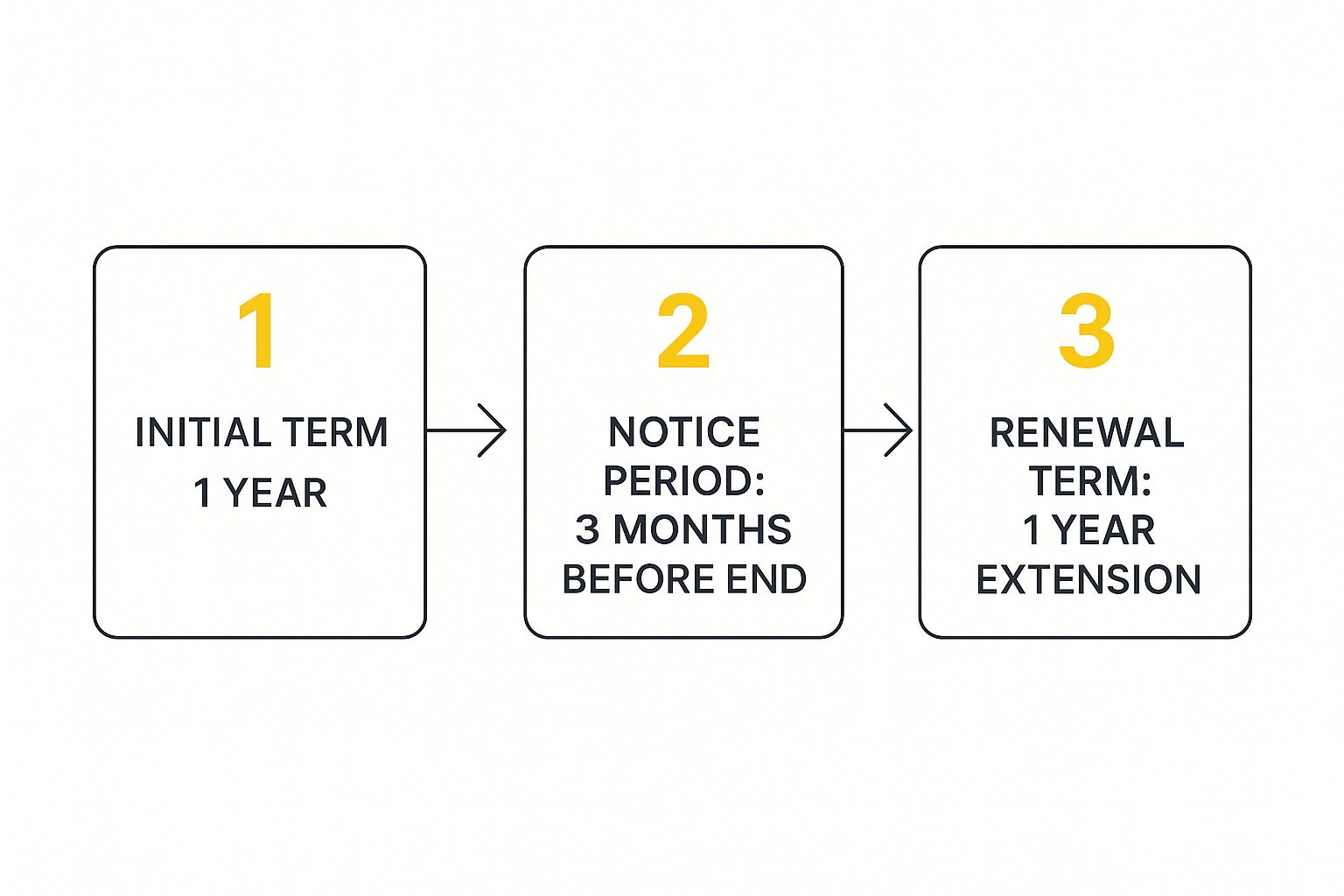
As you can see, the key to a smooth transition between lease periods is proactive communication, all framed by that crucial three-month notice period.
Your Top Questions About Moroccan Rental Agreements Answered
Even after getting to grips with the basics of a contrat de bail maroc, you're bound to have a few more specific questions. Let's tackle some of the most common queries that pop up for both tenants and landlords, giving you the clarity you need to handle tricky situations like a pro.
How Do Rent Increases Work in Morocco?
A landlord can't just decide to raise the rent on a whim. Thankfully, Moroccan law puts some clear rules in place to keep things fair. For residential homes, a landlord has to wait until three full years of the tenancy have passed before they can even suggest a rent review.
After that initial period, any future increases can only happen every three years. The increase itself is also capped by law, generally at a maximum of 8% for residential leases. Crucially, any change must be formally communicated and agreed upon; it can't just be forced on the tenant.
What's the Proper Way to End a Lease Early?
Breaking a lease before its end date is a serious matter with a strict legal process. If you, as a tenant, need to move out early, your first move should be to discuss it with your landlord and try to find a mutual agreement. Just walking away from the property is a bad idea—it can land you in legal trouble for the unpaid rent.
If it's the landlord who wants to terminate the lease early, they need a legally sound reason. This could be needing the property for their own personal use or for an immediate family member. In any scenario, a formal notice period is required, which is typically at least two months. This notice isn't just a simple letter; it has to be delivered by a judicial officer to be considered legally valid.
The security deposit is hands-down the most common source of arguments. Your best defence is a thorough
état des lieux(property condition report) signed at the very beginning of your tenancy. It’s the single most important piece of evidence you'll have to ensure you get your deposit back fairly and quickly.
What Happens to My Deposit if There's Damage?
The security deposit, or dépôt de garantie, is there to protect the landlord from unpaid rent or damage that goes beyond normal wear and tear. When your lease is up, you'll do another état des lieux to compare the property's current state against how it was when you first moved in.
If the inspection reveals damages, the landlord is entitled to deduct the repair costs from your deposit. However, they can't just pull a number out of thin air. They must provide you with official invoices or quotes to justify every dirham deducted. Any remaining balance must be returned to you within a set timeframe, which is usually a maximum of 60 days from when you hand back the keys.
What Should I Do if a Dispute Kicks Off?
If you find yourself in a disagreement over your contrat de bail maroc, the first and best step is always open and honest communication. You'd be surprised how many problems can be sorted out with a simple, calm conversation.
If talking it out doesn't work, the next stage is formal conciliation. This can be overseen by a legal professional or a conciliation commission at the local court. Should that fail, either party can then take the final step of filing a claim with the court of first instance (Tribunal de Première Instance) to get a legal judgment.
Navigating the Moroccan property market is much easier with a trusted partner by your side. At Rich Lion Properties, we offer expert guidance to make sure your rental, purchase, or sale is managed with the professionalism and attention it deserves. Let us help you make your next property move a success.
Discover our services and see our latest listings by visiting the Rich Lion Properties website.

